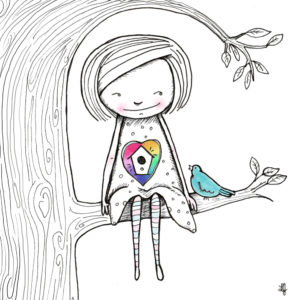When I was a kid, I’m not sure I knew there was a thing called marketing — sales… yes, advertising… yes, marketing… no. My dad was an aeronautical engineer. My mom was an artist and a teacher. Most of my mom’s family became ministers and doctors. Few family dinnertime discussions involved the concept of marketing.
 So it’s a little strange for me, at this point in my career, to think that it’s probably accurate to call me a marketer. I’m not big on labels, but I guess I’m okay with it. I have definitely spent a chunk of my career with the word marketing located somewhere on my business card.
So it’s a little strange for me, at this point in my career, to think that it’s probably accurate to call me a marketer. I’m not big on labels, but I guess I’m okay with it. I have definitely spent a chunk of my career with the word marketing located somewhere on my business card.
To be fair, there have been some times where I didn’t enjoy being the marketing guy… I was maybe even a little ashamed. In the spirit of “can’t we all just get along?”, I often harbored the thought “can’t people just buy our stuff?” after walking out of some tense staff meetings.
When sales numbers came up short, pressure was often applied to marketing (and sales) to “turn up the heat”. We were supposed to figure out some extraordinary way to generate new leads that would enable us to hit quarterly revenue estimates. It always irked me that the resulting action might be disruptive to some set of unsuspecting humans. I try to avoid annoying humans wherever possible.
Dan and Chip Heath recently wrote a book called The Power of Moments. They point out that most people’s memory of a life experience is often skewed by extreme high points or low points. The Heaths provide an example of a middle-quality hotel that gets extra high ratings partly because they have a “popsicle hotline” by the pool. Guests can pick up the red phone, order cherry, grape or orange popsicles and have them delivered instantly by a white-gloved server. This one magical aspect of an otherwise average hotel experience is enough to inflate the hotel’s ratings to stellar levels.
The Memory Economy
I think that’s really what marketing is about… not skewing results or ratings… but creating memories on behalf of yourself and your brand — hopefully positive memories in the minds of your potential audience. Also, thinking up novel ways to surprise and delight them never hurts.
In today’s Attention Economy, the supply of marketing messages far outweighs consumer demand for said messages. It’s the attention grabbing, short-term tactics that give marketers a bad name and make my skin crawl a little bit. Just like there are evil doctors, ministers and teachers somewhere… there are always going to be a segment of marketers that tarnish the name.
Thankfully, two of my favorite authors are constantly helping me stay above water re my willingness to self-select into the marketing category.
“Don’t confuse the word “marketing” with advertising, announcing, spamming, or giving away branded crap. Really, “marketing” just means being considerate. Marketing means making it easy for people to notice you, relate to you, remember you, and tell their friends about you.”
Likewise, Seth Godin recently restated some of his classic wisdom on the The Moment with Brian Koppelman. I’ll paraphrase — Seth basically says that many people confuse quality and excellence, with regard to companies. Seth says that the term “quality” is about hitting a certain specification around product creation — hitting the spec, no less, no more. Excellence is about being more human — delivering experiences in a way that demonstrates that you care.
Marketing as a Birdhouse
I think both of these perspectives are what modern marketing is about. In a time when people have infinite choices about where to focus their attention, they will return to a place that feels more human.
So I’ve come up with my own go-to concept of marketing that makes me feel better when I’m drinking coffee in the morning. I think when marketing is done right, it’s a little like that They Might Be Giants song about making a little birdhouse in your soul. I hope the lyrics actually fit the story. I’m one of those people who hear Hendrix saying “‘scuse me while I kiss this guy”. I never know what Kurt Cobain is singing about.

The perfect drawing above was created by Lynn Jenner – thanks Lynn! Thanks also to Seth and Derek.
Anyway, making birdhouses makes me feel better than disrupting and annoying people.